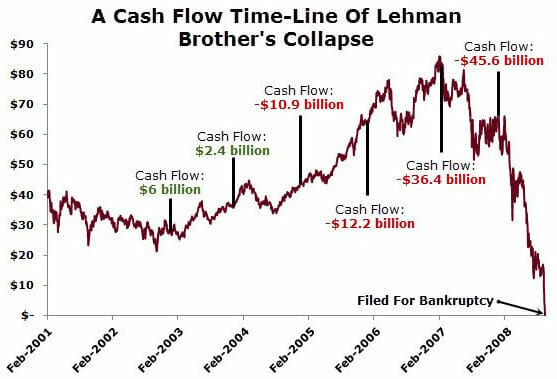The AI Race Heats Up… Is Google A “Buy”?… The Most Honest Number In Finance
Today’s issue is going to be a little different.
As you know, Monday is President’s Day. The market will be closed. And as we get ready for the long weekend, I have two things I’d like to share with you.
The first is something new we’re trying… My colleague Jimmy Butts issued a video alert to his Capital Wealth Letter readers about the artificial intelligence race, which is heating up and getting a lot of media attention. In it, he discusses how Alphabet (Nasdaq: GOOGL), better known as Google, fits into the battle — and how it may be a buying opportunity.
You can check it out by clicking the video below. A condensed and edited text version follows.
And to cap things off, I’m also including a classic essay from Jimmy about the importance of cash flow. As he put it, cash flow just might be the most honest number in finance.
Enjoy,
Brad Briggs
StreetAuthority Insider
Video: The AI Race Is On… And It’s A Great Chance To Buy This Tech Stock
Hey guys, Jimmy Butts here with Capital Wealth Letter. Today I want to give you a quick update on a portfolio holding, Alphabet (Nasdaq: GOOGL), better known as Google.
Last week on February 8th, shares tumbled roughly 8%. The following day shares slid another 5%. That’s a pretty big move.

That 8% move wiped about a hundred billion off its market cap.
So what happened? What’s going on? Should we be concerned? Those are some of the questions I hope to answer.
First, what happened…
Google’s Bard Blunder
Last week Google published a video presentation of their AI software, Bard, which is their Chat GPT competitor.
This is artificial intelligence software that interacts in a conversational way. If you’re not familiar, that’s okay. I’ll touch on them here in a second.
But back to Google’s presentation. As they were showcasing their AI software, Bard answered a question incorrectly. Immediately after, shares of Alphabet tumbled 8%.
As you can see here by this NPR headline:
 I personally believe this is a major overreaction, and offers investors a good buying opportunity.
I personally believe this is a major overreaction, and offers investors a good buying opportunity.
People aren’t looking at Alphabet’s fundamentals. Perhaps they glossed over the fact that the company made $60 billion in free cash flow last year.
To put that into perspective they could give every person in the entire state of Texas $2 grand and still have money left over.
But regardless, the bigger takeaway is the anticipation and tension surrounding this artificial intelligence.
Now if you’re not familiar with all the racket surrounding AI (artificial intelligence) like Chat GPT and Google’s Bard, let me give you a quick rundown.
The Future Of AI Is Here…
First off, Chat GPT is pretty cool. If you haven’t messed around with it, I highly encourage you to go check it out.
Using the ChatGPT’s AI software you can type in a question, and it’ll spit out an answer. Hopefully it’s correct answer, but an answer nonetheless. There’s still a lot of work to be done.
For instance, it can’t give you answers to any relevant information. I think it’s database ends in 2021 or maybe 2020. So, you can’t ask it about something that happened last week. It also can’t do things like answer basic riddles.
For instance, I found this example:
“Mike’s mom had four kids. Three of them are Luke, Drake, and Matilda, what is the name of the fourth kid?”
The AI software says, “it is not possible to determine the name of the fourth child without more information.”
The guy responds: “The answer is in the question.”
The Chat AI software says, “I apologize for the confusion. It is not possible to determine the name of the fourth child based on the information provided, blah, blah, blah, blah.”
And the answer is, Mike, in case you are wondering. So like I said, there’s still a little bit of work that needs to be done. But more often than not, Chat GPT is really interesting. It’ll provide fascinating or sometimes excellent answers. You can have it explain some pretty complex topics.
Closing Thoughts
As we’ve seen the harsh reaction from Google Bard’s blunder last week, the arms race for artificial intelligence is heating up. In Chat GPT, Microsoft invested more than $10 billion into this software to hopefully incorporate it into their search engine.
And this has a lot of people worried about the future of AI and how it might take over people’s jobs, which it will probably will.
So it’s a hot topic right now. But you know, the bottom line is I’m confident Alphabet will get things ironed out with their AI software and they’ll be competitive in the space. But in the meantime, I believe that this is a good buying opportunity.
So hopefully, that explains things, and you got a better idea of why roughly $170 billion was wiped off of Alphabet’s market cap last week.
In the meantime, if you have any questions, don’t hesitate to email me at CapitalWealthLetter@Investingdaily.com.
The Most Important Fundamental Metric Of All…
 Of all the information generated by the stock market, there’s one piece of data that I rely on more than just about anything else: cash flow.
Of all the information generated by the stock market, there’s one piece of data that I rely on more than just about anything else: cash flow.
It’s critical to the system we use in my Maximum Profit premium service, helping us reap bigger gains in less time. I also use it in my other premium service, Capital Wealth Letter. That’s because I consider it a foundational piece of any serious fundamental analysis process.
Today, I want to talk a little more about this fundamental metric because it’s so important, yet all too often ignored by most investors.
In fact, I’d go as far as to say that if I could only look at one fundamental metric to find winning picks, this would be it.
Cash Flow: The Most Honest Number In Finance
Many investors are already familiar with cash flow. But they may not realize just how important it is in relation to successful investing.
You see, cash flow is the only figure that a can’t be fudged with fancy accounting tricks.
All other figures that a company reports can be manipulated.
A company can inflate its earnings… report misleading revenue… but they can’t fudge the cash flow… the actual cold hard cash a company receives while doing business.
All the major corporate accounting scandals… Waste Management, Enron, Worldcom, Tyco, Healthsouth, Freddie Mac, AIG, Lehman Brothers… could have been avoided simply by looking at those companies’ cash flows before they crashed.
Just look at Lehman Bros for instance…

In the years leading up to the company’s collapse, the cash flow shriveled to zero and went into the negative. This alone was a huge red flag to any investor owning shares over that period.
The one thing Lehman Brothers and each of the other companies I mentioned have in common is that they were cooking the books.
They manipulated earnings… downplayed expenses… but they couldn’t fudge their cash flow figures: the actual money they were bringing in. It was the one thing that would have tipped you off to sell the stock fast. And it’s one piece of data every company generates that you can accurately rely on.
Now, knowing we can use this information to avoid losses is comforting. It greatly cuts unnecessary investment risk. But more to the point, cash flow is a key piece of data that our algorithm uses to identify winners as well.
Cash Flow 101
Let’s dive a little deeper to see exactly what cash flow’s role is in spotting winning trades in the stock market.
I like to call cash flow the “most honest number in finance.” And as we talked about in the above Lehman Brothers example, it’s the lifeblood of any company. It has the innate ability to show you when things are starting to become dire at any firm.
Cash flow is the money a business uses to buy new factories, pour into research and development, or deliver back to its investors through dividends and share buybacks.
Think of it this way — if someone you knew earned $5,000 a month but spent $7,000, they’d be in bad shape. That would make paying bills extremely tough and building wealth next to impossible.
Compare that to someone who spends the same amount but brings in $20,000 a month. They have plenty to not only meet their expenses, but also save, invest, go on vacation, etc.
It’s obvious who you would rather be.
Companies need cash flow more than earnings to survive. (Enron had earnings but lacked cash flow.) Strong cash flow allows a company to reward investors with dividends and reinvest in growth.
Bringing It All Together
There is much more to fundamental analysis than P/E ratios, earnings growth, and dividend yields. And researchers have found that cash flow is a much better indicator of future stock returns than income statement metrics like earnings. Detailed analysis shows that companies with more cash flow than earnings tend to perform better over a 12-month period.
In fact, when we were developing my Maximum Profit premium service, we did some rigorous backtesting. We found that based on this singular data piece alone, you could handily outperform the broader market. Time and time again, it identified investing opportunities by simply scanning for companies that were growing cash flow rapidly.
Now, I’m not saying you should base all of your trades or investments around cash flow alone. But I am saying that you should seriously incorporate it into your analysis when looking at investment candidates. If the average individual investor spent more time doing that instead of looking at metrics like earnings, they’d be a lot better for it.
P.S. How would you like to get paid every month from your portfolio? It’s easier than you might think…
My colleague Nathan Slaughter makes it his business to research the best income payers the market has to offer. And he’s finding dozens of high-yielding monthly dividend payers out there that most investors don’t even know exist…
In his latest report, Nathan reveals 12 of his favorite monthly dividend payers offering market-crushing yields. You could start receiving payouts every single month! Go here now to learn more…
